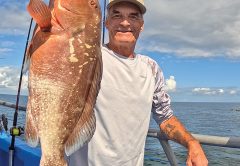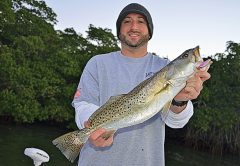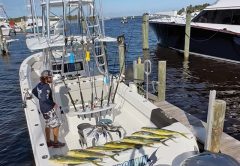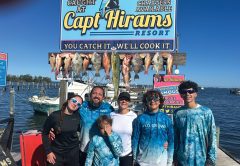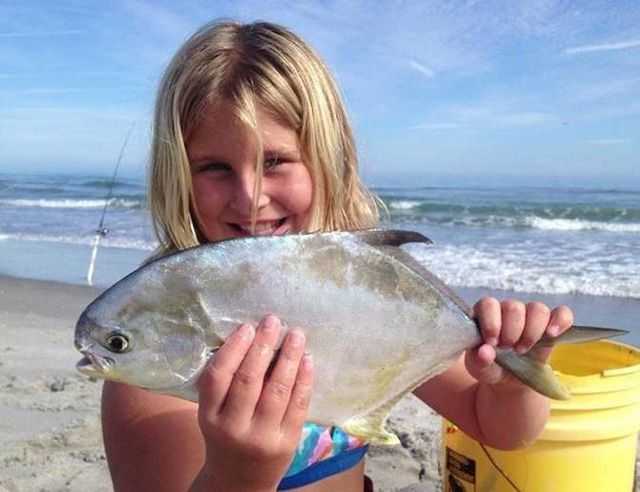
Capt. Rodney’s Fishing Corner
People often ask me if this or that fish is edible; I tell ’em yes; all fish are edible, it just depends on how you prepare them.
This is another question I recently heard from one of the anglers attending one of the several fishing workshops I conduct each winter. “What’s the best white, flaky fish to eat in Florida?” The more I thought about the question, the more I realized the answer was going to be opinionated.
People are weird when it comes to eating fish. Heck, nowadays people are strange about eating everything and anything! Have you noticed all the choices there are in the supermarket today for things like milk, creamer, cereal, bread, etc., compared to just a generation ago? I digress; now let’s get back to the topic of what my choices are for Florida’s best eating fish.

Snook: Florida’s iconic snook is hands down the best tasting fish caught in Florida’s waters. Here are several reasons why. They are hard to catch. Their flavor is mild and pleasurable to the palate. Their meat is firm, but not like the stiffness of a cobia or wahoo fillet; snook is perfectly flaky and almost melts in your mouth. Being a protected gamefish, you can’t buy or sell it, so in my mind this makes snook fillets priceless. It also keeps well in the freezer or refrigerator. Snook are easy to fillet, but be sure you always remove their skin before cooking. Be careful to avoid their razor sharp gill plates and pointed spines.
Lionfish: They are Florida’s new seafood craze! Lionfish are absolutely fantastic eating whole or filleted. From here on, look out for them more often on seafood menus around the Sunshine State. If you want to catch them yourself, be especially careful to avoid their poisonous spines. You’ll probably need a pair of flippers, a spear and a mask to best harvest this invasive species; lionfish don’t take baits as well as many of our reef fish.
Tripletail: They are not as easy to clean as snook or quite as mild tasting, but tripletail has a flavorful taste. Some think it has a taste a little like a mixture of snook and blue crab meat. When cleaning tripletail, be careful of their gill plates and fins; they’ll get you. Fillets don’t last in the refrigerator or on ice as long as snook or flounder, but they do hold up longer than mullet or mackerel, and they do freeze fairly well, also. Their texture is semi-firm.
Flounder: Their delicious and semi-firm fillets have earned flounder a reputation as fine table fare. Remember to fillet their bottom sides (white) before filleting their topsides (brown). (Small strips of the flounder’s white belly skin work well for tipping jigs.)
Pompano: This is one of the ocean’s most sought after prizes for the recreational angler’s table or the seafood market. You might ask why pompano fetch such a high price, and the answer is because pompano are pretty fish that keep well on ice or in the freezer. They’re easy to clean, and you can cook them whole; please remove their guts first. Their skin is tasty. They’re fun to catch, and accessible to shore anglers.
Mangrove (gray) snapper: For a smaller-sized fish they are excellent for eating whole or filleted. I like catching them almost as much as I enjoy eating them. Their meat is best on the fish weighing less than three pounds.
Spanish mackerel and bluefish: These toothy critters are easy to catch from the beach, and just as easy to clean, but you should eat them within 48 hours of taking them out of the water. They don’t freeze well (oily fish don’t) or last long on ice. Their flesh is a little mushy, but they have a load of flavor when fried in a little oil or butter and served with hushpuppies and grits.
I can hear the naysayers now. “What about tuna, wahoo, mullet, hogfish, whiting, sheepshead, triggerfish, grouper or dolphin?” I say they are all delicious when cooked fresh and prepared with flair.
Now start eating!
Learn more about Florida’s natural resources by reading or listening to Captain Rodney Smith’s books Catching Made Easy and Enjoying Life on the Indian River Lagoon Coast. To contact Capt. Smith about a private fishing lesson, call him at 321-750-3374, or send an email to irlcoast@gmail.com or checkout rodneysmithmedia.com.

